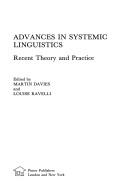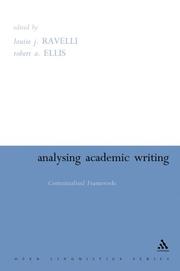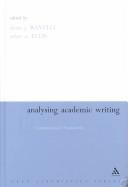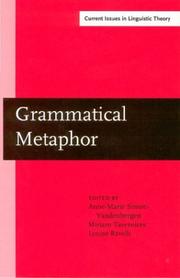| Listing 1 - 9 of 9 |
Sort by
|

ISBN: 0415284309 0415284295 9786610715183 1134453574 1280715189 0203964187 9780415284301 9780415284295 Year: 2005 Publisher: London Routledge
Abstract | Keywords | Export | Availability | Bookmark
 Loading...
Loading...Choose an application
- Reference Manager
- EndNote
- RefWorks (Direct export to RefWorks)
Communication in museums --- Museums --- Social aspects --- Museology --- museology --- museum administration --- museumbeheer --- museumkunde

Abstract | Keywords | Export | Availability | Bookmark
 Loading...
Loading...Choose an application
- Reference Manager
- EndNote
- RefWorks (Direct export to RefWorks)
Discourse analysis --- Systemic grammar --- 802.0-56 --- 802.0-56 Engels: syntaxis; semantiek --- Engels: syntaxis; semantiek --- Neo-Firthian linguistics --- Scale-and-category grammar --- System-structure grammar --- Systemic linguistics --- Grammar, Comparative and general --- Linguistic analysis (Linguistics) --- Structural linguistics --- Linguistics
Book
Year: 1999 Publisher: Clifton : Nottingham Trent university. Department of English and media studies,
Abstract | Keywords | Export | Availability | Bookmark
 Loading...
Loading...Choose an application
- Reference Manager
- EndNote
- RefWorks (Direct export to RefWorks)

Abstract | Keywords | Export | Availability | Bookmark
 Loading...
Loading...Choose an application
- Reference Manager
- EndNote
- RefWorks (Direct export to RefWorks)

ISBN: 0826461077 Year: 2005 Publisher: London Continuum
Abstract | Keywords | Export | Availability | Bookmark
 Loading...
Loading...Choose an application
- Reference Manager
- EndNote
- RefWorks (Direct export to RefWorks)
English language --- Report writing --- Rhetoric --- Study and teaching --- Evaluation. --- Foreign speakers
Book
ISBN: 0415716187 113474790X 1134747977 1138499110 1315880032 9781315880037 9781138499119 9780415716185 Year: 2016 Publisher: New York Routledge
Abstract | Keywords | Export | Availability | Bookmark
 Loading...
Loading...Choose an application
- Reference Manager
- EndNote
- RefWorks (Direct export to RefWorks)
This book provides an extended exploration of the multimodal analysis of spatial (three-dimensional) texts of the built environment, culminating in a holistic approach termed Spatial Discourse Analysis (SpDA). Based on existing frameworks of multimodal analysis, this book applies, adapts, and extends these frameworks to spatial texts. The authors argue that choices in spatial design create meanings about what we perceive and how we can or should behave within spatial texts, influence how we feel in and about those spaces, and enable these texts to function as coherent wholes. Importantly, a spatial text, once built, is also a resource which is then used, and an essential aspect of understanding these texts is to consider what users themselves contribute to the meaning potential of these texts. The book takes the metafunctional approach familiar from Systemic-Functional Linguistics (SFL) and foregrounds each metafunction in turn (textual, interpersonal, experiential, and logical), in relation to the detailed analysis of a particular spatial text.
Modality (Linguistics) --- Critical discourse analysis --- Discourse analysis --- Social aspects

ISSN: 03040763 ISBN: 1283312123 9786613312129 9027275319 9789027275318 9781588113689 158811368X 9781283312127 158811368X 902724748X 9789027247483 6613312126 Year: 2003 Volume: 236 Publisher: Amsterdam Philadelphia Benjamins Pub. Co.
Abstract | Keywords | Export | Availability | Bookmark
 Loading...
Loading...Choose an application
- Reference Manager
- EndNote
- RefWorks (Direct export to RefWorks)
Since the 1980's, metaphor has received much attention in linguistics in general. Within Systemic Functional Linguistics (SFL) the area of 'grammatical metaphor' has become increasingly more important. This volume aims to raise and debate problematic issues in the study of lexico-grammatical metaphor, and to foreground the potential of further study in the field. There is a need to highlight the SFL perspective on metaphor; other traditions focus on lexical aspects, and from cognitive perspectives, while SFL focuses on the grammatical dimension, and socio-functional aspects in the explanation...
Metaphor. --- Systemic grammar. --- Language acquisition. --- Acquisition of language --- Developmental linguistics --- Developmental psycholinguistics --- Language and languages --- Language development in children --- Psycholinguistics, Developmental --- Interpersonal communication in children --- Psycholinguistics --- Neo-Firthian linguistics --- Scale-and-category grammar --- System-structure grammar --- Systemic linguistics --- Grammar, Comparative and general --- Linguistic analysis (Linguistics) --- Structural linguistics --- Parabole --- Figures of speech --- Reification --- Acquisition --- Language acquisition --- Metaphor --- Systemic grammar --- Métaphore --- Grammaire systémique --- Langage --- Lexicology. Semantics --- Grammar
Book
ISBN: 0367504553 1003049923 1000865738 1003049923 9781003049920 9780367504557 Year: 2023 Publisher: New York Routledge
Abstract | Keywords | Export | Availability | Bookmark
 Loading...
Loading...Choose an application
- Reference Manager
- EndNote
- RefWorks (Direct export to RefWorks)
This edited volume brings together two largely separate fields - organization studies and multimodal social semiotics - to develop an integrated research agenda for the novel interdisciplinary field of 'organizational semiotics'. Organizations, whether for profit, non-profit, or governmental, dominate much of everyday life, and multimodal communication is not only an output of organizations, it is constitutive of them. This volume argues in particular for the importance of organization studies for social semioticians: not just as a site of application, but as a critical contemporary context which requires novel and expanded methods of analysis and critique, and new practices of partnership. The volume addresses a range of institutions and sectors, from civil to retail to medical, from corporations to universities, and reveals how a deep engagement with their meaning-making practices produces insights not just about communication but also about the broader contemporary cultural context in which organizations play such a significant role. Fundamentally, it reveals that the rich analytical and theoretical resources of multimodal perspectives on organizations studies can - and should - make a fundamental contribution to our understanding of organizations in social life. This volume is relevant to social semioticians and organizational researchers, as well as to practitioners and decision-makers in organizations.
Organizational sociology --- Semiotics --- Modality (Linguistics) --- Social aspects
Book

ISBN: 1281990825 9786611990824 3110211394 9783110211399 3110188309 9783110188301 9783110226041 Year: 2008 Publisher: Berlin Boston
Abstract | Keywords | Export | Availability | Bookmark
 Loading...
Loading...Choose an application
- Reference Manager
- EndNote
- RefWorks (Direct export to RefWorks)
Interpersonal communication (IC) is a continuous game between the interacting interactants. It is a give and take - a continuous, dynamic flow that is linguistically realized as discourse as an on-going sequence of interactants' moves. Interpersonal communication is produced and interpreted by acting linguistically, and this makes it a fascinating research area. The handbook, Interpersonal Communication , examines how interactants manage to exchange facts, ideas, views, opinions, beliefs, emotion, etc. by using the linguistic systems and the resources they offer. In interpersonal communication, the fine-tuning of individuals' use of the linguistic resources is continuously probed. The language used in interpersonal communication enhances social relations between interactants and keeps the interaction on the normal track. When interaction gets off the track, linguistic miscommunication may also destroy social relationships. This volume is essentially concerned with this fine-tuning in discourse, and how it is achieved among various interactant groups. The volume departs from the following fundamental questions: How do interpersonal relations manifest themselves in language? What is the role of language in developing and maintaining relationships in interpersonal communication? What types of problems occur in interpersonal communication and what kind of strategies and means are used to solve them? How does linguistically realized interpersonal communication interact with other semiotic modes? Interpersonal communication is seen and researched from the perspective of what is being said or written, and how it is realized in various generic forms. The current research also gives attention to other semiotic modes which interact with the linguistic modes. It is not just the social roles of interactants in groups, the possible media available, the non-verbal behaviors, the varying contextual frames for communication, but primarily the actual linguistic manifestations that we need to focus upon when we want to have a full picture of what is going on in human interpersonal communication. It is this linguistic perspective that the volume aims to present to all researchers interested in IC. The volume offers an overview of the theories, methods, tools, and resources of linguistically-oriented approaches, e.g. from the fields of linguistics, social psychology, sociology, and semiotics, for the purpose of integration and further development of the interests in IC., Topics e.g.: Orientation to interaction as primarily linguistically realized processes Expertise on theorizing and analyzing cultural and situational contexts where linguistic processes are realized Expertise on handling language corpora Expertise on theorizing and analyzing interaction types as genres Orientation to an integrated view of linguistic and non-linguistic participant activities and of how interactants generate meanings and interact with space Expertise on researching the management of the linguistic flow in interaction and its successfulness.
Interpersonal communication --- Communication. --- Communication, Primitive --- Mass communication --- Sociology --- Communication --- Interpersonal relations --- Applied linguistics. --- communication and social interaction. --- interpersonal communication.
| Listing 1 - 9 of 9 |
Sort by
|

 Search
Search Feedback
Feedback About UniCat
About UniCat  Help
Help News
News